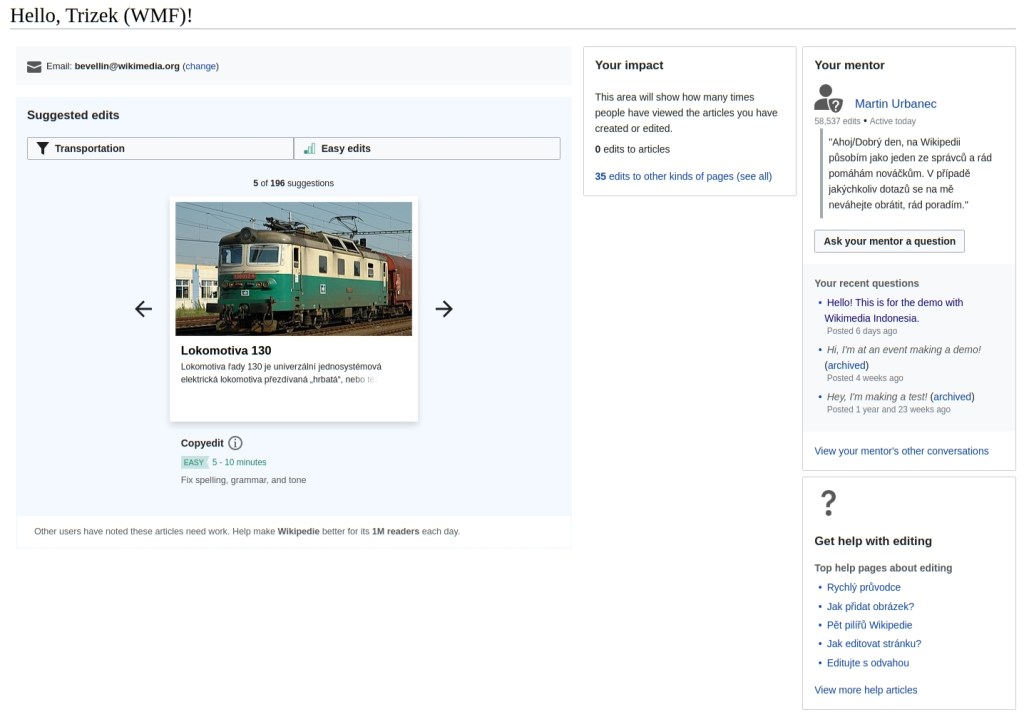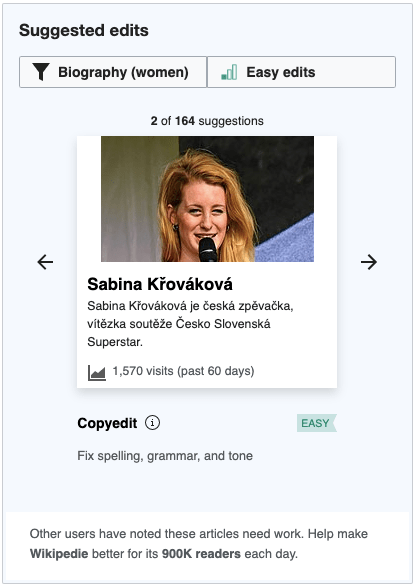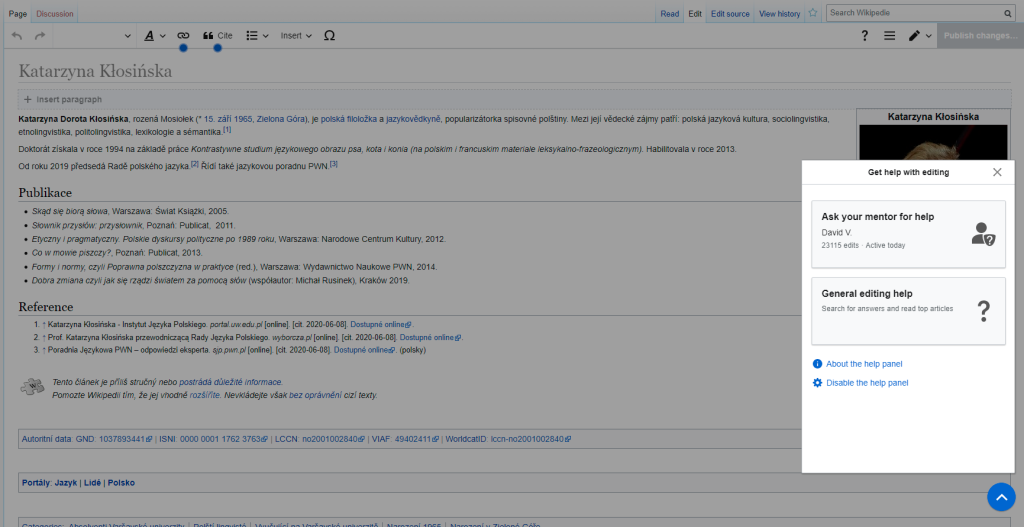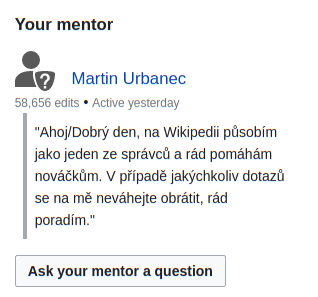Newcomers are critical for the health of our projects: we need new people creating content, helping diversifying our content, and becoming long-term community members. Yet research has shown that newcomers struggle to edit and continue editing Wikipedia because of three main challenges: technical, conceptual, and cultural.

All Wikimedians were new at some point, and so we can all remember how confusing the first steps are. The active Wikimedians who make up our communities today are the few people who succeeded in learning how to participate. We believe more people should have the opportunity to participate, and so we need to give newcomers access to the resources they need to surmount the technical, conceptual, and cultural challenges.
To increase the number of newcomers that can join our communities productively, the Wikimedia Foundation Growth team has been building a cohesive newcomer experience, shown to improve newcomer outcomes.

- Newcomer homepage: a special page that contains the main things a newcomer needs to get started, including “newcomer tasks”, impact statistics, and a connection to an experienced mentor.

- Newcomer tasks: a feed of suggested edits that help newcomers learn to edit. Newcomers have been making productive edits through this feed! The feed is the primary feature on the homepage.

- Help panel: a platform to provide resources to newcomers while they are editing, giving them access to guidance, help documents, and mentorship.
All of these features work on both desktop and mobile. While they go to newcomers by default, experienced users can also turn them on in their preferences. So far, the features are deployed to 20 Wikipedias, including large wikis such as Arabic, French, and Russian. You can try the features on these wikis, and also on test.wikipedia.org.
Most importantly, these features have been shown to increase the activation, retention, and edit volume of newcomers (see below). We are working with communities now to deploy them to all Wikipedias!
Growth features are helping newcomers
In November 2019, the Growth team added the “newcomer tasks” feature to the newcomer homepage. Newcomer tasks provides a feed of suggested articles to edit, tailored to the area of interests of the newcomer. In particular, we believe that it’s important for newcomers to make real edits to articles — as opposed to practicing in their sandbox — because we want them to quickly see their impact and be excited about continuing. Newcomer tasks help make sure that these first real edits are productive.
Our hypothesis was that the tools would make it more likely for newcomers to start editing, to learn editing skills, see their impact, and then continue editing. From November 2019 to May 2020, the Growth team conducted an A/B test to assess the impact of the tools. We collected data from Arabic, Vietnamese, Czech, and Korean Wikipedias, to cover a wide range of cultures in editing.

The analysis finds that the Growth features lead to increases in:
- the probability that newcomers make their first article edit (+11.6%)
- the probability that they are retained as editors
- the number of edits they make during their first two weeks on the wiki (+22%)
We also find that the quality of their edits is comparable to that of a control group.
To date, over 70,000 suggested edits have been completed by over 10,000 users.
Spreading to all Wikipedias
Because of our data showing their effectiveness, and because we continue to hear positive community feedback from the wikis where the Growth tools are already deployed, we believe that all Wikipedias can benefit from the Growth features.
If your community is not already in discussion with our team to have the Growth features being deployed to your Wikipedia, we will soon contact you on your Village Pump. To get started sooner, please contact us on our talk page or read about the process to get the features. You can help by working on translations (translations are on Translatewiki.net, which requires a separate account from your Wikimedia one), or by translating the project pages to your language.
Mentorship
Mentorship is an important part of the Growth features. Community members are invited to sign up as “welcoming mentors” and be assigned automatically to new accounts. Newcomers see and contact their mentor on their newcomer homepage.
Being a mentor is an easy way to have an impact on your wiki, because you help others make their impact. Most newcomers ask simple questions that moderately experienced Wikimedians can answer. The Growth team has assembled some resources for mentors and we are currently working on new tools to help mentors interact with their mentees.
Looking ahead to structured tasks
We want anyone to be able to participate in Wikipedia, no matter their background, skills, location, device, or anything else. Though newcomer tasks have been successful in helping many newcomers make their first edits, we think that many newcomers still struggle to participate. Right now, newcomer tasks do not give any specific instructions on exactly where and how to edit an article.
To address this, the Growth team is currently working on “structured tasks”, which break down editing workflows into steps that make sense for newcomers and make sense on mobile devices. We believe these simple workflows will allow more new people to begin participating, Some of whom will learn to do more substantial edits and get involved with their communities.

After discussing the idea of structured tasks with community members, we are currently building the first structured task: “add a link“. This task will use an algorithm to point out words or phrases that may be good wikilinks, and newcomers will accept or reject the suggestions. We are also planning work on a similar task to add images. If you have any ideas or concerns, please join the conversations for these projects!
As the team always does, structured tasks will first be tested on our four pilot Wikipedias: Arabic, Bengali, Czech and Vietnameset. We’ll use the experience on these wikis to learn and improve the features before deploying them to the rest of the wikis. We prioritize making sure that communities will be comfortable with our features and that they result in improvements to the wikis.
Follow us!
The Growth team publishes a regular newsletter and you can find short weekly updates on mediawiki.org. Please contact us on our talk page!

Can you help us translate this article?
In order for this article to reach as many people as possible we would like your help. Can you translate this article to get the message out?
Start translation
